Two-Parent Households: Positive Impacts on Child Development & Success
VerifiedAdded on 2023/04/12
|5
|1187
|57
Essay
AI Summary
This essay discusses the importance of two-parent households for child development, highlighting the advantages children gain in terms of health, academic achievement, social competence, and reduced engagement in risky behaviors. It contrasts the outcomes of children raised by two parents versus single parents, citing research that supports the positive impact of having both parents involved in a child's upbringing. The essay emphasizes that children in two-parent homes are more likely to have better access to healthcare, achieve higher grades, develop stronger communication skills, and avoid dangerous behaviors such as drug abuse. The conclusion reinforces the idea that a two-parent family structure provides a more stable and supportive environment, leading to healthier and more successful outcomes for children. Desklib offers a platform to explore similar essays and research on family structures and child development.
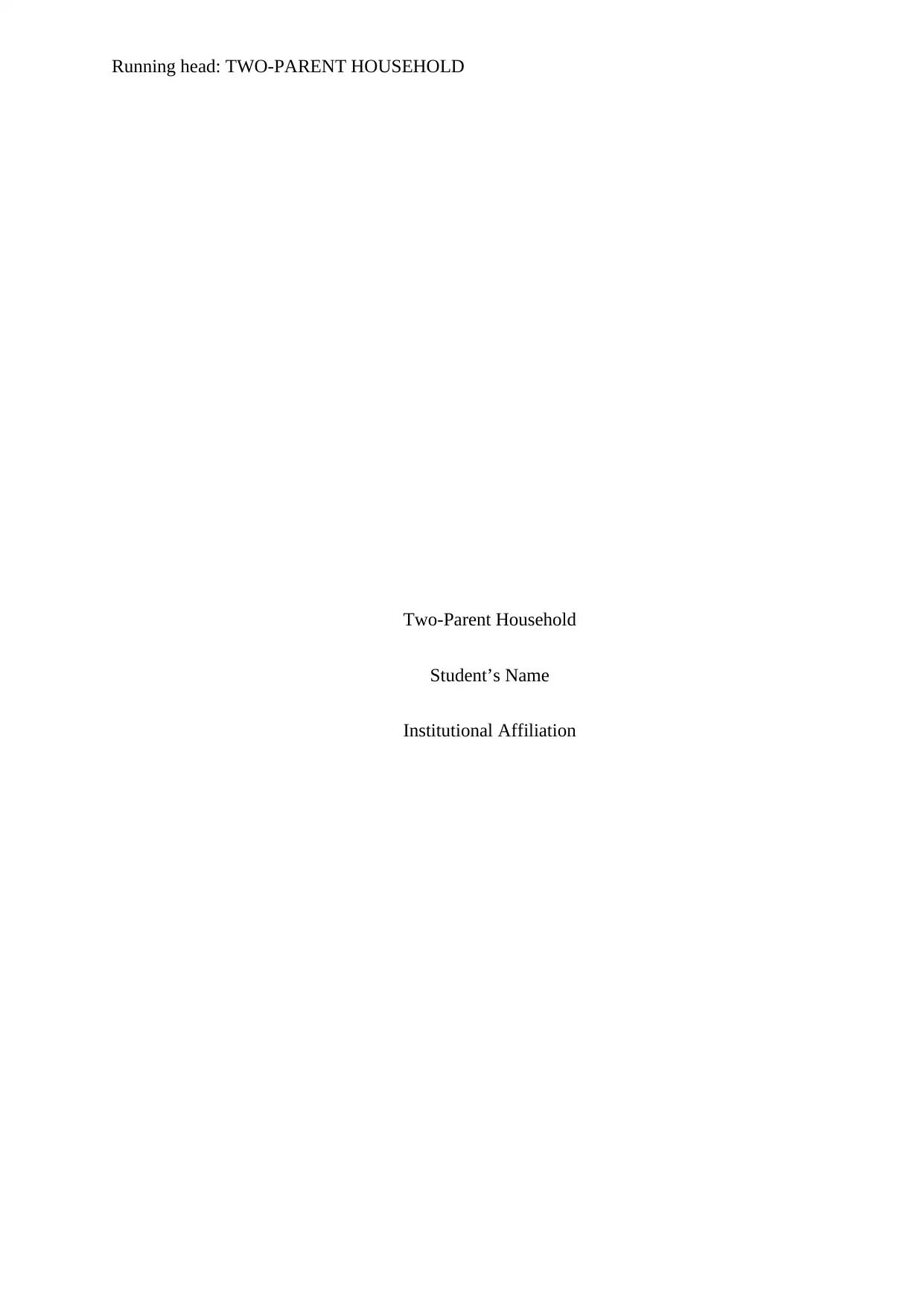
Running head: TWO-PARENT HOUSEHOLD
Two-Parent Household
Student’s Name
Institutional Affiliation
Two-Parent Household
Student’s Name
Institutional Affiliation
Paraphrase This Document
Need a fresh take? Get an instant paraphrase of this document with our AI Paraphraser
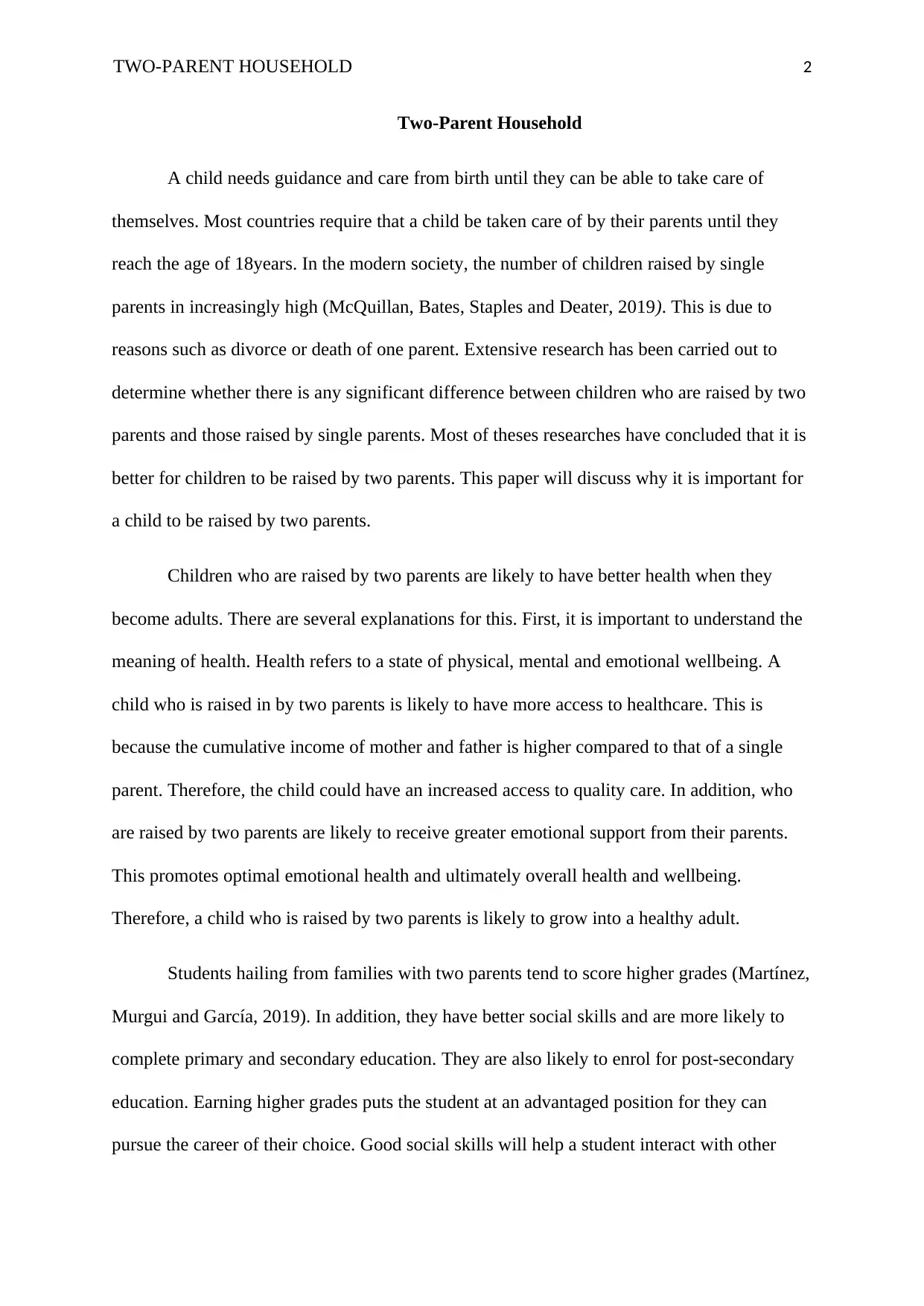
TWO-PARENT HOUSEHOLD 2
Two-Parent Household
A child needs guidance and care from birth until they can be able to take care of
themselves. Most countries require that a child be taken care of by their parents until they
reach the age of 18years. In the modern society, the number of children raised by single
parents in increasingly high (McQuillan, Bates, Staples and Deater, 2019). This is due to
reasons such as divorce or death of one parent. Extensive research has been carried out to
determine whether there is any significant difference between children who are raised by two
parents and those raised by single parents. Most of theses researches have concluded that it is
better for children to be raised by two parents. This paper will discuss why it is important for
a child to be raised by two parents.
Children who are raised by two parents are likely to have better health when they
become adults. There are several explanations for this. First, it is important to understand the
meaning of health. Health refers to a state of physical, mental and emotional wellbeing. A
child who is raised in by two parents is likely to have more access to healthcare. This is
because the cumulative income of mother and father is higher compared to that of a single
parent. Therefore, the child could have an increased access to quality care. In addition, who
are raised by two parents are likely to receive greater emotional support from their parents.
This promotes optimal emotional health and ultimately overall health and wellbeing.
Therefore, a child who is raised by two parents is likely to grow into a healthy adult.
Students hailing from families with two parents tend to score higher grades (Martínez,
Murgui and García, 2019). In addition, they have better social skills and are more likely to
complete primary and secondary education. They are also likely to enrol for post-secondary
education. Earning higher grades puts the student at an advantaged position for they can
pursue the career of their choice. Good social skills will help a student interact with other
Two-Parent Household
A child needs guidance and care from birth until they can be able to take care of
themselves. Most countries require that a child be taken care of by their parents until they
reach the age of 18years. In the modern society, the number of children raised by single
parents in increasingly high (McQuillan, Bates, Staples and Deater, 2019). This is due to
reasons such as divorce or death of one parent. Extensive research has been carried out to
determine whether there is any significant difference between children who are raised by two
parents and those raised by single parents. Most of theses researches have concluded that it is
better for children to be raised by two parents. This paper will discuss why it is important for
a child to be raised by two parents.
Children who are raised by two parents are likely to have better health when they
become adults. There are several explanations for this. First, it is important to understand the
meaning of health. Health refers to a state of physical, mental and emotional wellbeing. A
child who is raised in by two parents is likely to have more access to healthcare. This is
because the cumulative income of mother and father is higher compared to that of a single
parent. Therefore, the child could have an increased access to quality care. In addition, who
are raised by two parents are likely to receive greater emotional support from their parents.
This promotes optimal emotional health and ultimately overall health and wellbeing.
Therefore, a child who is raised by two parents is likely to grow into a healthy adult.
Students hailing from families with two parents tend to score higher grades (Martínez,
Murgui and García, 2019). In addition, they have better social skills and are more likely to
complete primary and secondary education. They are also likely to enrol for post-secondary
education. Earning higher grades puts the student at an advantaged position for they can
pursue the career of their choice. Good social skills will help a student interact with other
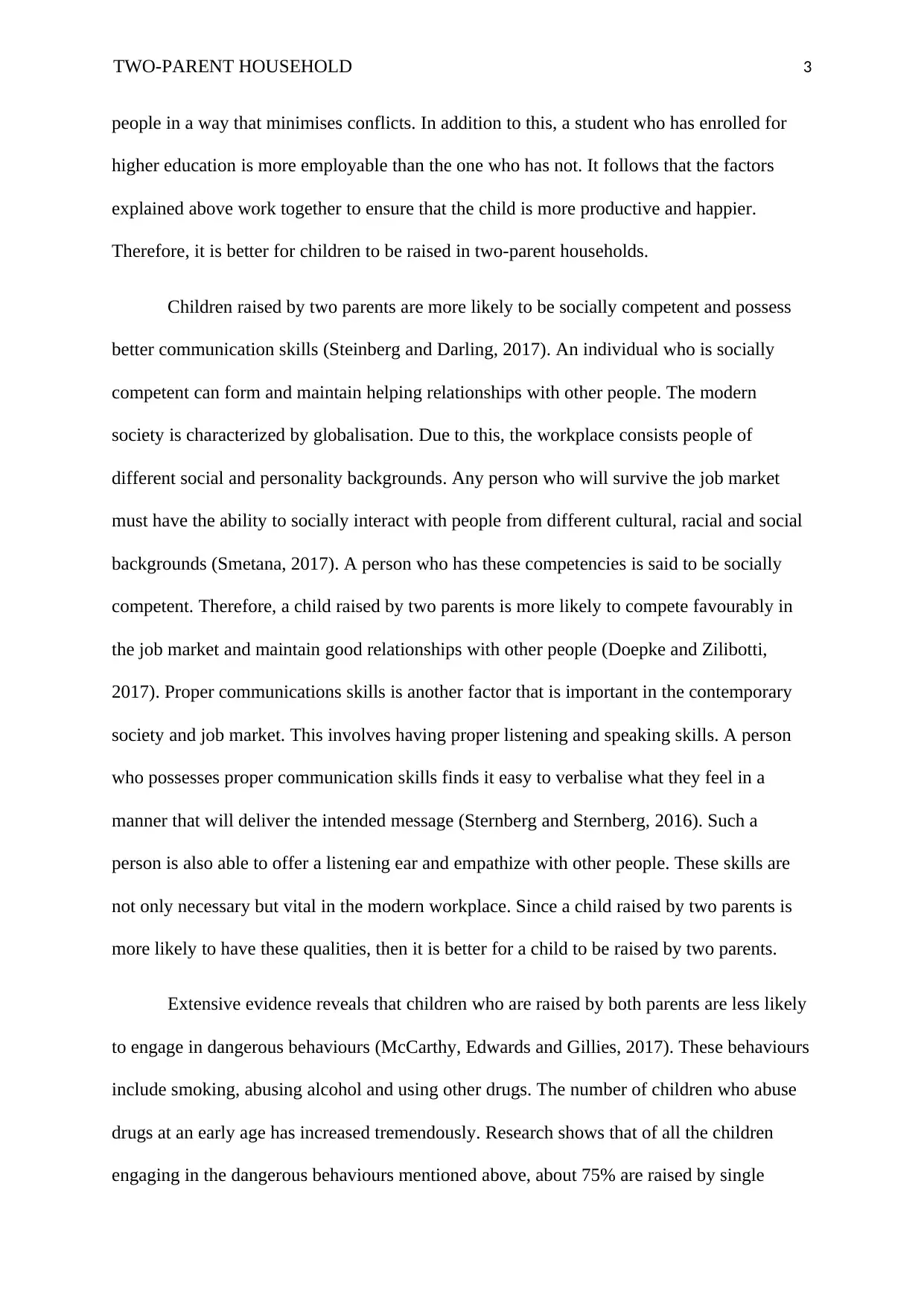
TWO-PARENT HOUSEHOLD 3
people in a way that minimises conflicts. In addition to this, a student who has enrolled for
higher education is more employable than the one who has not. It follows that the factors
explained above work together to ensure that the child is more productive and happier.
Therefore, it is better for children to be raised in two-parent households.
Children raised by two parents are more likely to be socially competent and possess
better communication skills (Steinberg and Darling, 2017). An individual who is socially
competent can form and maintain helping relationships with other people. The modern
society is characterized by globalisation. Due to this, the workplace consists people of
different social and personality backgrounds. Any person who will survive the job market
must have the ability to socially interact with people from different cultural, racial and social
backgrounds (Smetana, 2017). A person who has these competencies is said to be socially
competent. Therefore, a child raised by two parents is more likely to compete favourably in
the job market and maintain good relationships with other people (Doepke and Zilibotti,
2017). Proper communications skills is another factor that is important in the contemporary
society and job market. This involves having proper listening and speaking skills. A person
who possesses proper communication skills finds it easy to verbalise what they feel in a
manner that will deliver the intended message (Sternberg and Sternberg, 2016). Such a
person is also able to offer a listening ear and empathize with other people. These skills are
not only necessary but vital in the modern workplace. Since a child raised by two parents is
more likely to have these qualities, then it is better for a child to be raised by two parents.
Extensive evidence reveals that children who are raised by both parents are less likely
to engage in dangerous behaviours (McCarthy, Edwards and Gillies, 2017). These behaviours
include smoking, abusing alcohol and using other drugs. The number of children who abuse
drugs at an early age has increased tremendously. Research shows that of all the children
engaging in the dangerous behaviours mentioned above, about 75% are raised by single
people in a way that minimises conflicts. In addition to this, a student who has enrolled for
higher education is more employable than the one who has not. It follows that the factors
explained above work together to ensure that the child is more productive and happier.
Therefore, it is better for children to be raised in two-parent households.
Children raised by two parents are more likely to be socially competent and possess
better communication skills (Steinberg and Darling, 2017). An individual who is socially
competent can form and maintain helping relationships with other people. The modern
society is characterized by globalisation. Due to this, the workplace consists people of
different social and personality backgrounds. Any person who will survive the job market
must have the ability to socially interact with people from different cultural, racial and social
backgrounds (Smetana, 2017). A person who has these competencies is said to be socially
competent. Therefore, a child raised by two parents is more likely to compete favourably in
the job market and maintain good relationships with other people (Doepke and Zilibotti,
2017). Proper communications skills is another factor that is important in the contemporary
society and job market. This involves having proper listening and speaking skills. A person
who possesses proper communication skills finds it easy to verbalise what they feel in a
manner that will deliver the intended message (Sternberg and Sternberg, 2016). Such a
person is also able to offer a listening ear and empathize with other people. These skills are
not only necessary but vital in the modern workplace. Since a child raised by two parents is
more likely to have these qualities, then it is better for a child to be raised by two parents.
Extensive evidence reveals that children who are raised by both parents are less likely
to engage in dangerous behaviours (McCarthy, Edwards and Gillies, 2017). These behaviours
include smoking, abusing alcohol and using other drugs. The number of children who abuse
drugs at an early age has increased tremendously. Research shows that of all the children
engaging in the dangerous behaviours mentioned above, about 75% are raised by single
⊘ This is a preview!⊘
Do you want full access?
Subscribe today to unlock all pages.

Trusted by 1+ million students worldwide
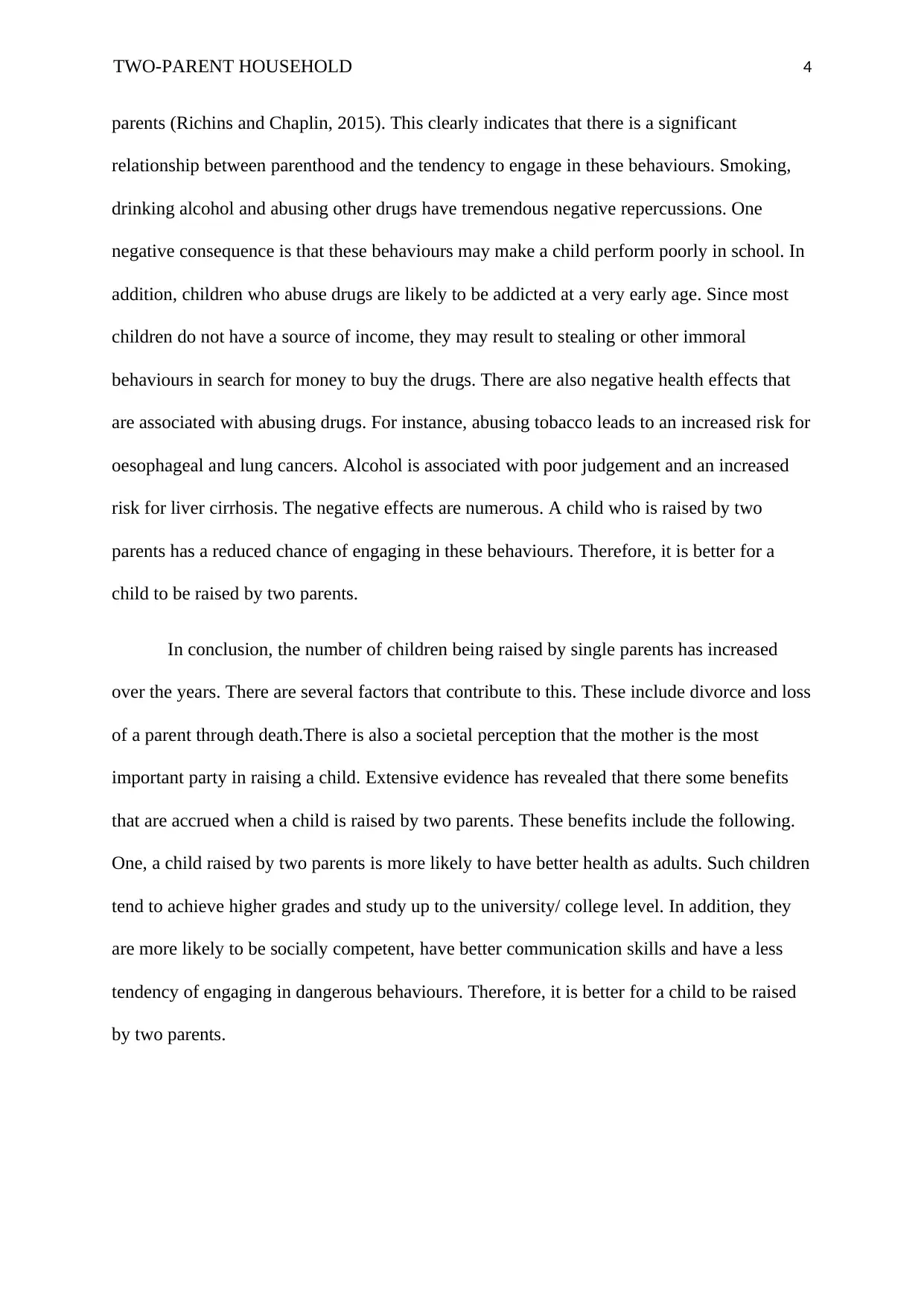
TWO-PARENT HOUSEHOLD 4
parents (Richins and Chaplin, 2015). This clearly indicates that there is a significant
relationship between parenthood and the tendency to engage in these behaviours. Smoking,
drinking alcohol and abusing other drugs have tremendous negative repercussions. One
negative consequence is that these behaviours may make a child perform poorly in school. In
addition, children who abuse drugs are likely to be addicted at a very early age. Since most
children do not have a source of income, they may result to stealing or other immoral
behaviours in search for money to buy the drugs. There are also negative health effects that
are associated with abusing drugs. For instance, abusing tobacco leads to an increased risk for
oesophageal and lung cancers. Alcohol is associated with poor judgement and an increased
risk for liver cirrhosis. The negative effects are numerous. A child who is raised by two
parents has a reduced chance of engaging in these behaviours. Therefore, it is better for a
child to be raised by two parents.
In conclusion, the number of children being raised by single parents has increased
over the years. There are several factors that contribute to this. These include divorce and loss
of a parent through death.There is also a societal perception that the mother is the most
important party in raising a child. Extensive evidence has revealed that there some benefits
that are accrued when a child is raised by two parents. These benefits include the following.
One, a child raised by two parents is more likely to have better health as adults. Such children
tend to achieve higher grades and study up to the university/ college level. In addition, they
are more likely to be socially competent, have better communication skills and have a less
tendency of engaging in dangerous behaviours. Therefore, it is better for a child to be raised
by two parents.
parents (Richins and Chaplin, 2015). This clearly indicates that there is a significant
relationship between parenthood and the tendency to engage in these behaviours. Smoking,
drinking alcohol and abusing other drugs have tremendous negative repercussions. One
negative consequence is that these behaviours may make a child perform poorly in school. In
addition, children who abuse drugs are likely to be addicted at a very early age. Since most
children do not have a source of income, they may result to stealing or other immoral
behaviours in search for money to buy the drugs. There are also negative health effects that
are associated with abusing drugs. For instance, abusing tobacco leads to an increased risk for
oesophageal and lung cancers. Alcohol is associated with poor judgement and an increased
risk for liver cirrhosis. The negative effects are numerous. A child who is raised by two
parents has a reduced chance of engaging in these behaviours. Therefore, it is better for a
child to be raised by two parents.
In conclusion, the number of children being raised by single parents has increased
over the years. There are several factors that contribute to this. These include divorce and loss
of a parent through death.There is also a societal perception that the mother is the most
important party in raising a child. Extensive evidence has revealed that there some benefits
that are accrued when a child is raised by two parents. These benefits include the following.
One, a child raised by two parents is more likely to have better health as adults. Such children
tend to achieve higher grades and study up to the university/ college level. In addition, they
are more likely to be socially competent, have better communication skills and have a less
tendency of engaging in dangerous behaviours. Therefore, it is better for a child to be raised
by two parents.
Paraphrase This Document
Need a fresh take? Get an instant paraphrase of this document with our AI Paraphraser
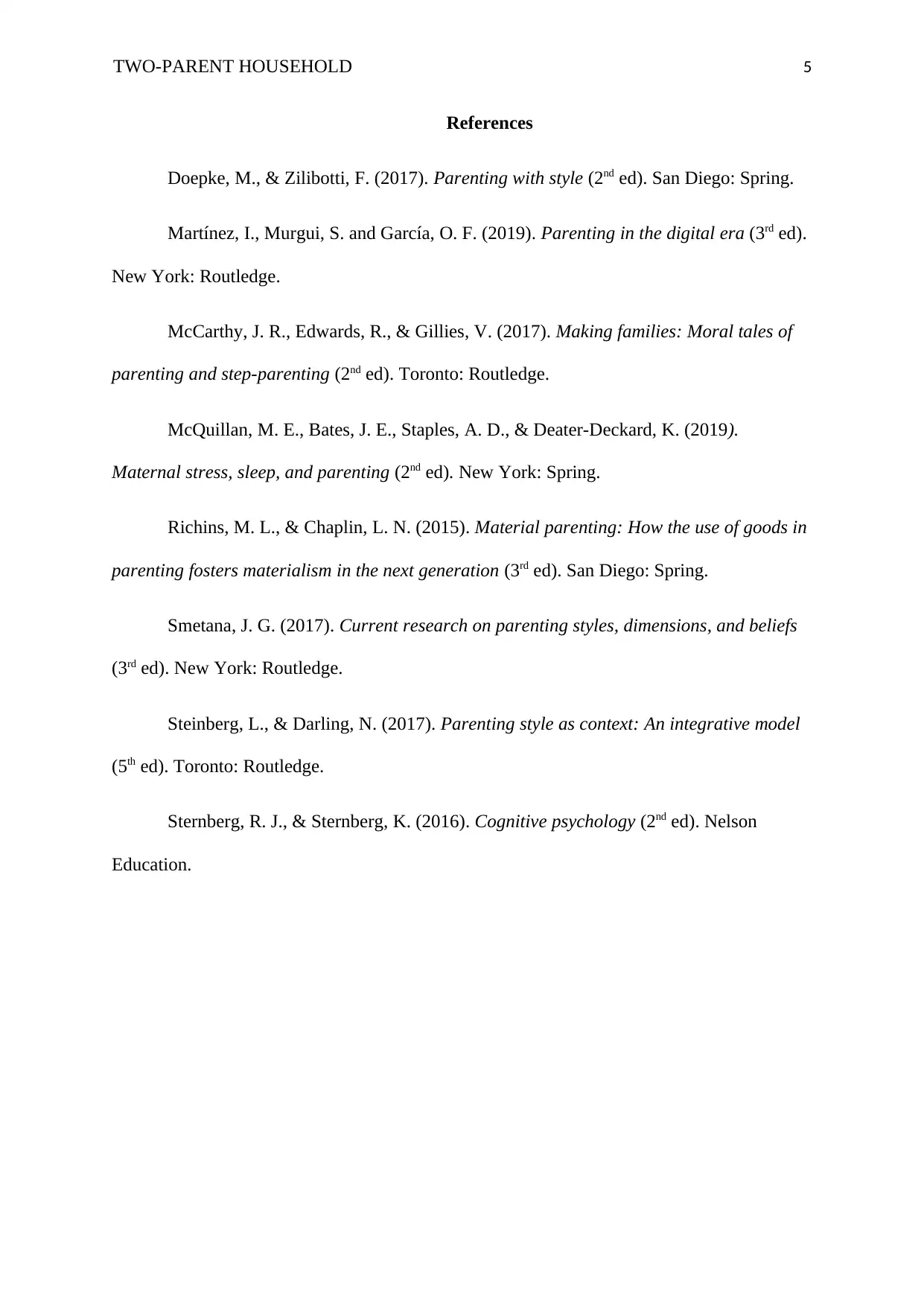
TWO-PARENT HOUSEHOLD 5
References
Doepke, M., & Zilibotti, F. (2017). Parenting with style (2nd ed). San Diego: Spring.
Martínez, I., Murgui, S. and García, O. F. (2019). Parenting in the digital era (3rd ed).
New York: Routledge.
McCarthy, J. R., Edwards, R., & Gillies, V. (2017). Making families: Moral tales of
parenting and step-parenting (2nd ed). Toronto: Routledge.
McQuillan, M. E., Bates, J. E., Staples, A. D., & Deater-Deckard, K. (2019).
Maternal stress, sleep, and parenting (2nd ed). New York: Spring.
Richins, M. L., & Chaplin, L. N. (2015). Material parenting: How the use of goods in
parenting fosters materialism in the next generation (3rd ed). San Diego: Spring.
Smetana, J. G. (2017). Current research on parenting styles, dimensions, and beliefs
(3rd ed). New York: Routledge.
Steinberg, L., & Darling, N. (2017). Parenting style as context: An integrative model
(5th ed). Toronto: Routledge.
Sternberg, R. J., & Sternberg, K. (2016). Cognitive psychology (2nd ed). Nelson
Education.
References
Doepke, M., & Zilibotti, F. (2017). Parenting with style (2nd ed). San Diego: Spring.
Martínez, I., Murgui, S. and García, O. F. (2019). Parenting in the digital era (3rd ed).
New York: Routledge.
McCarthy, J. R., Edwards, R., & Gillies, V. (2017). Making families: Moral tales of
parenting and step-parenting (2nd ed). Toronto: Routledge.
McQuillan, M. E., Bates, J. E., Staples, A. D., & Deater-Deckard, K. (2019).
Maternal stress, sleep, and parenting (2nd ed). New York: Spring.
Richins, M. L., & Chaplin, L. N. (2015). Material parenting: How the use of goods in
parenting fosters materialism in the next generation (3rd ed). San Diego: Spring.
Smetana, J. G. (2017). Current research on parenting styles, dimensions, and beliefs
(3rd ed). New York: Routledge.
Steinberg, L., & Darling, N. (2017). Parenting style as context: An integrative model
(5th ed). Toronto: Routledge.
Sternberg, R. J., & Sternberg, K. (2016). Cognitive psychology (2nd ed). Nelson
Education.
1 out of 5
Related Documents
Your All-in-One AI-Powered Toolkit for Academic Success.
+13062052269
info@desklib.com
Available 24*7 on WhatsApp / Email
![[object Object]](/_next/static/media/star-bottom.7253800d.svg)
Unlock your academic potential
Copyright © 2020–2026 A2Z Services. All Rights Reserved. Developed and managed by ZUCOL.





